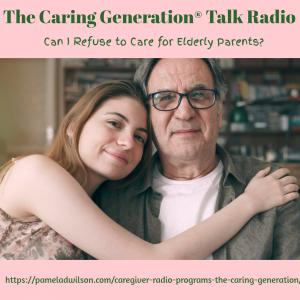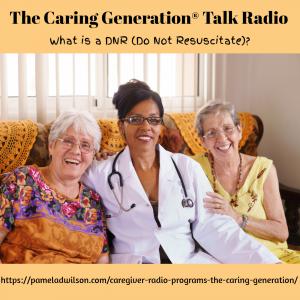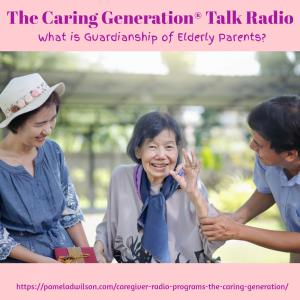Caregiving for the Elderly? Caregiving Experts Share Wisdom on The Caring Generation® Radio Program
The Caring Generation® Radio Program airs worldwide live on Wednesday evenings and is hosted by Pamela D Wilson Caregiving Expert.
GOLDEN, CO, USA, August 18, 2020 /EINPresswire.com/ -- Caregivers around the world can access proven and practical tips and solutions to caregiving problems plus gain education about self-care, health, and wellness on The Caring Generation® Radio Program that airs live worldwide on the BBM Global Network. Host Pamela D Wilson combines twenty years of experience managing the care of elderly and disabled clients with expert interviews on a wide variety of health subjects.
Wilson infuses humor and practical experience to entertain and educate listeners. Listener favorites from July and August are featured here with links to the podcast replays.
Can I Refuse to Care for Elderly Parents? & Understanding Male Caregivers
Caregivers often ask, “can I refuse to care for elderly parents?” There are two sides to every caregiving story. Few elderly parents are perfect. Neither are adult children who serve as caregivers. Many caregivers want to believe that relationships with elderly parents (and vice versa) will improve or work out—some do—some don’t.
When caregivers realize that they can’t change the behaviors of elderly parents—only how they respond to caregiving situations—the decision to care or not care for elderly parents becomes clearer. A son’s response to can I refuse to care for elderly parents may be “yes – but I will do it anyway.”
Some caregivers worry about what others will think of them if they refuse to care for elderly parents. Pressure may exist to “do the right thing”—even though doing so may negatively affect the career, family relationships, and financial savings of the caregiver and the caregiver’s family.
The idea of regret may affect a response to can I refuse to care for elderly parents? In some families, if a daughter or son says no to the question of can I refuse to care for elderly parents, there may be no one else to fill this role. In other situations, sons or daughters walk away and disappear.
A featured interview with Dr. Monika Lopez-Anuarbe, Associate Professor of Economics from Connecticut College, sheds light on her research article: Understanding Male Caregivers’ Emotional, Financial, and Physical Burden in the United States. Dr. Lopez-Anuarbe specializes in aging, caregiving, and health inequalities about family money transfers and unpaid caregiving to aging relatives and friends. The discussion with Wilson offers insight into the feelings and actions of male caregivers.
Do Not Resuscitate – What Is a DNR? & Why Physicians Are Uncomfortable Talking About End of Life Care
Talking about end of life care can be uncomfortable— even for physicians. Discussions and news about the coronavirus have increased awareness about end of life concerns. The elderly and persons with chronic diseases are more susceptible to the virus, and in some cases, the result is death.
When the coronavirus began, the news was obsessed with the idea of “not having enough ventilators”— without anyone talking about what a ventilator is and what being on a ventilator means. Few consumers genuinely understand the meaning of using a ventilator.
The ability to be placed on a ventilator is not always a life-saving measure. Why all the confusion? In part, it’s because doctors lack training about how to talk to patients about end of life care.
Guest Dr. Richard Balaban, Medical Director of the Department of Care Integration at Cambridge Health Alliance and Assistant Professor of Medicine at Harvard Medical School, joins this caregiving radio program. Dr. Balaban is an innovator in care transitions—developing cost-effective programs to support patients after hospital discharge.
The author of “A Physician’s Guide to Talking About End-Of-Life Care,” Dr. Balaban has a frank discussion with Wilson about the importance of talking about the end of life care. End of life care discussions are important to allow families time to discuss and plan for increasing care needs.
How to Become a Legal Guardian & What is Sepsis?
For eleven of Wilson’s 20+ year career as a professional care manager and a professional fiduciary, she served as a court-appointed guardian for the elderly and disabled. In this caregiver radio program, she shares tips for adult children asking how to become a legal guardian for elderly parents.
Dr. Bernardo Reyes, a board-certified Internist, and Geriatrician talks with Wilson about the risks of sepsis in older adults that can occur from chronic illness and the coronavirus. Reyes is an Assistant Professor of Geriatrics at the Charles E. Schmidt College of Medicine at Florida Atlantic University where he serves as the Director of the Geriatric and Palliative Rotations and Associate Director of the Internal Medicine Residency Program.
His unique experience working in hospitals and nursing homes provides practical advice and a unique perspective about managing and treating sepsis—which is often life-threatening for the elderly. Dr. Reyes is the author of the article: Sepsis in Older Adults in Long-Term Care Facilities: Challenges in Diagnosis and Management.
For more information about caregiving education, online video conferencing, speaking engagements, and elder care programs call Pamela D. Wilson at 303-810-1816 or email Inquiry_For_Pamela@PamelaDWilson.com
P Dombrowski-Wilson
Pamela D. Wilson, Inc.
+1 303-810-1816
email us here
Visit us on social media:
Facebook
Twitter
LinkedIn
Can I Refuse to Care?
Legal Disclaimer:
EIN Presswire provides this news content "as is" without warranty of any kind. We do not accept any responsibility or liability for the accuracy, content, images, videos, licenses, completeness, legality, or reliability of the information contained in this article. If you have any complaints or copyright issues related to this article, kindly contact the author above.



